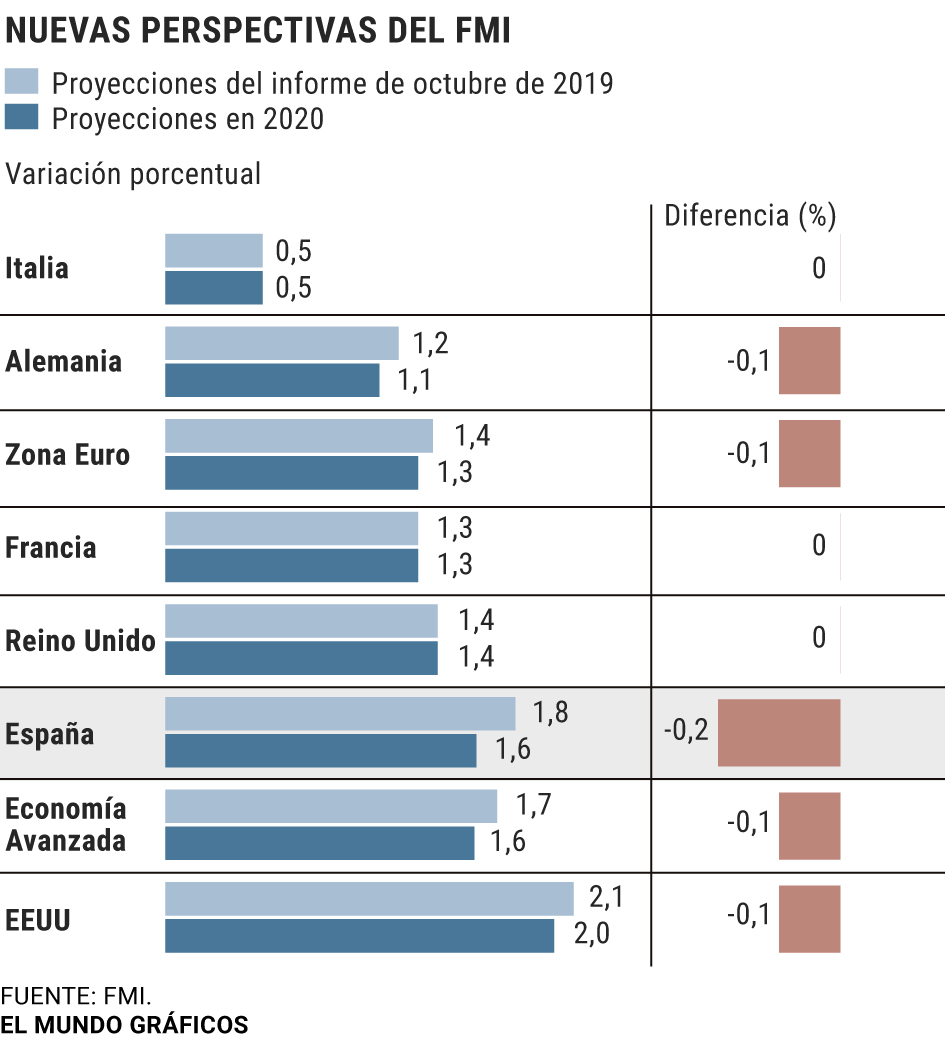At the conclusion of her presentation of the bittersweet forecasts of the International Monetary Fund (IMF) for the world economy, the managing director, Kristalina Georgieva, resorted to an appointment of Leon Tolstoy in Anna Karenina: «All diversity, all charm, all beauty of life is the fruit of light and shadow ». The Bulgarian added that she hoped that in 2020 the lights will dominate over the shadows but, among her estimates, she points to a darkening of one of the most luminous advanced economies so far and that has been growing in recent years more than the average: the Spanish.
The IMF's forecast is that the Spanish podium disappears. One of the great news of the economic recovery of Spain that consisted in growing more systematically than the average of what the international institution calls "advanced economies" vanishes. The new IMF forecast is that the national economy no longer stands out and will grow 1.6% this year, as do all of these advanced economies, which include those of the European Union, the United States, the United Kingdom or Canada, among others .
The Spanish economy is the one that slows down the most with respect to 2019, losing four tenths of growth, and it demarcates from the global trend that is that of a certain acceleration, although below expectations.
This breaks a Spanish trend that has been occurring since 2015 and allowed the president of the Government of that time, Mariano Rajoy, and, since June 2018, Pedro Sánchez, to presume that better behavior than the average of the industrialized powers. According to IMF data, still in 2014, the Spanish economy grew by 1.4%, down from 1.9% of that set of economies.
But already in 2015 it jumped to 3.2%, compared to 1.9% of the rest; and in 2016, at a similar pace, compared to 1.7% of advanced economies. In 2017 the distance remained between 3.2% versus 2.2%, but narrowed in 2018 with 2.5% and 2.2% of the average respectively.
As for 2019, the estimate is that the Spanish economy will still stand out with 2%, compared to 1.7% of the average to already fall to 1.6% in 2020 and 2021. By maintaining a higher unemployment rate and Due to the set of advanced economies, Spain should maintain a growth difference in order to continue correcting its competitiveness imbalances compared to the rest, but the engine slows down.
The IMF does believe that Spain will continue to grow above the Eurozone average, but with a decreasing distance that in 2021 will already be only 1.6% Spanish versus 1.4% European average, as Germany and France gain momentum .
In fact, Spain became yesterday in the developed economy to which the IMF most lowers its growth forecasts since last October, “due to the consequences of a more marked deceleration than expected of domestic demand and exports in 2019 ». Consequently, it reduces two tenths from the 1.8% estimated last fall, to the current 1.6% by 2020. It thus departs from the official government forecast that still believes that GDP may grow by 1.8% in this first year of the legislature.
The deputy director of the IMF study service, Gian Maria Milesi-Ferretti, highlighted the confluence in the Spanish case of the loss of internal consumption bellows and "the weak international context." He also pointed out that he had taken into account the accounting review of the National Statistics Institute.
Within the euro group, the IMF also also cuts, and to a lesser extent, its forecast for Germany, which falls by one tenth and will grow 1.1% this year.
The general diagnosis of the IMF is that the world economy continues to rebound, but with a downward revision. «The forecast is that global growth, which according to estimates was 2.9% in 2019, increases to 3.3% in 2020 and 3.4% in 2021; that is, a downward revision of 0.1% for 2019 and 2020 and 0.2% for 2021, compared to the figures presented in the October issue of World Economy Outlook, ”says the institution. The slowdowns in India, Mexico or the effects of social unrest in Chile have worsened the outlook for so-called emerging countries.
As a counterpoint, the IMF highlights "the general reorientation towards an accommodative monetary policy" of central banks; «The intermittently favorable news about the trade negotiations between the United States and China», «and the lesser fears of a Brexit without agreement».
From the IMF report it follows that its technicians share part of the program of the new Spanish Government, aimed at correcting inequalities and "inclusive growth", but not if that implies more public deficit. “Unless private demand is very weak, countries with high levels of debt should, in general, carry out consolidations [deficit cuts via less spending or more income] in order to be prepared for the next slowdown and spending in benefits ahead, ”he says.
On the other hand, the IMF economists insist that the healthy ones like Germany and the Netherlands - they did not mention Spain - should “increase spending on initiatives that promote productivity growth, in areas such as research, training and physical infrastructure ».
As for the United States, «growth is expected to moderate from 2.3% in 2019 to 2% in 2020 and then to 1.7% in 2021 (0.1% less in 2020 than in October). The moderation is due, according to the IMF, to greater budgetary containment and a lower effect of the Federal Reserve's monetary policy .
According to the criteria of The Trust Project
Know more- IMF
- Spain
- Germany
- U.S
- GDP
- Pedro Sanchez
- INE
- United Kingdom
- European Union
- China
Davos 2020 The IMF already cuts Spain's growth to 1.6% this year: "Its slowdown is more marked than expected"
Interview Thier Breton: "The big tech companies will have to adapt to European regulations"
International FairFitur 2020: Spanish tourism puts the focus on the Amsterdam model

